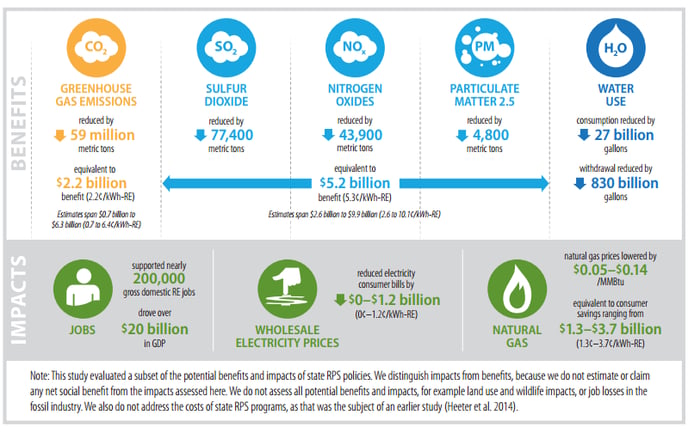Strengthening the Massachusetts Clean Energy Standard
This month, the Mass. Department of Environmental Protection (DEP) is taking comments on a discussion document...
In the wee hours of the morning stretching the final day of the 2016 legislative session, the Renewable Energy Standard (RES) extension bills passed in both the Senate and the House.
As we’ve reported in past blogs, the RES increases the percentage of renewable energy sources in Rhode Island’s electricity mix. The RES is the same policy mechanism that other states call “Renewable Portfolio Standards” or “RPS”. It’s a critical tool that reduces our dependence on dirty fossil fuels. The law was set to plateau in 2019, but now with this extension the RES will continue to grow renewables incrementally until 2035.

This graph demonstrates in yellow where original legislation left the RES mandate, capped indefinitely at 14.5% renewables. With the recent extension, the amount of renewable energy will continue to grow 1.5% until 2035, shown in green on the graph.
The RES extension is a necessary step among many to meet the goals in the Resilient RI Act and reduce our greenhouse gas emissions 80% by 2050 (see the blue line), which is what we must do to minimize the devastating consequences of climate change. Furthermore, the mandate to increase renewables in our electricity mix works to reduce our reliance on expensive fossil fuels like natural gas imported from other states.
A study earlier this year by the National Renewable Energy Laboratory (NREL) and the Lawrence Berkeley National Laboratory (LBNL) confirmed that RPS policies across the country bring host of benefits. In 2013, clean sources developed through RPS policies saved consumers up to $1.2 billion from reduced wholesale electricity prices. Their analysis also reported $2.6-$9.9 billion of health and environmental benefits nationally for 2013.

Increased renewable energy sources have several public health benefits, including reduction of asthma rates, morbidity, hospital admission for respiratory and cardiovascular symptoms, and event lost work days. With the RES extended, Rhode Island will continue to keep pace with the changing energy systems and shifting clean energy economies of other states.
PP&L applauds you, our members, who contacted your Senators and Representatives to express your support. As lead sponsor of the House RES bill Rep. Deborah Ruggiero said at PP&L’s 14th Annual Meeting, “We cannot do what we do in the legislature without advocacy”. She went on, “We’ve gone from being a laggard in renewable energy in 2010 to being a leader in 2016”.
Governor Raimondo’s administration supports the RES extension and PP&L is pleased to report that the RES extension was officially signed into law on June 27th.
Want to know more details and outcomes from the latest legislative session? Stay tuned for another blog post reflecting on the outcomes of other RI advocacy efforts for 2016.
This month, the Mass. Department of Environmental Protection (DEP) is taking comments on a discussion document...
Last week, with a resounding vote of 144-12, the Massachusetts House of Representatives passed the Offshore Wind...
Comments